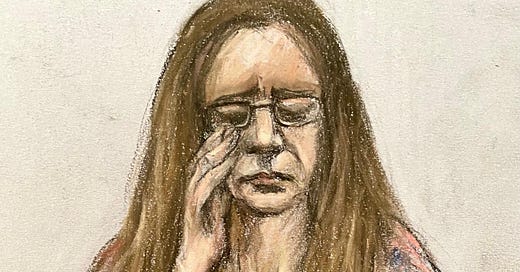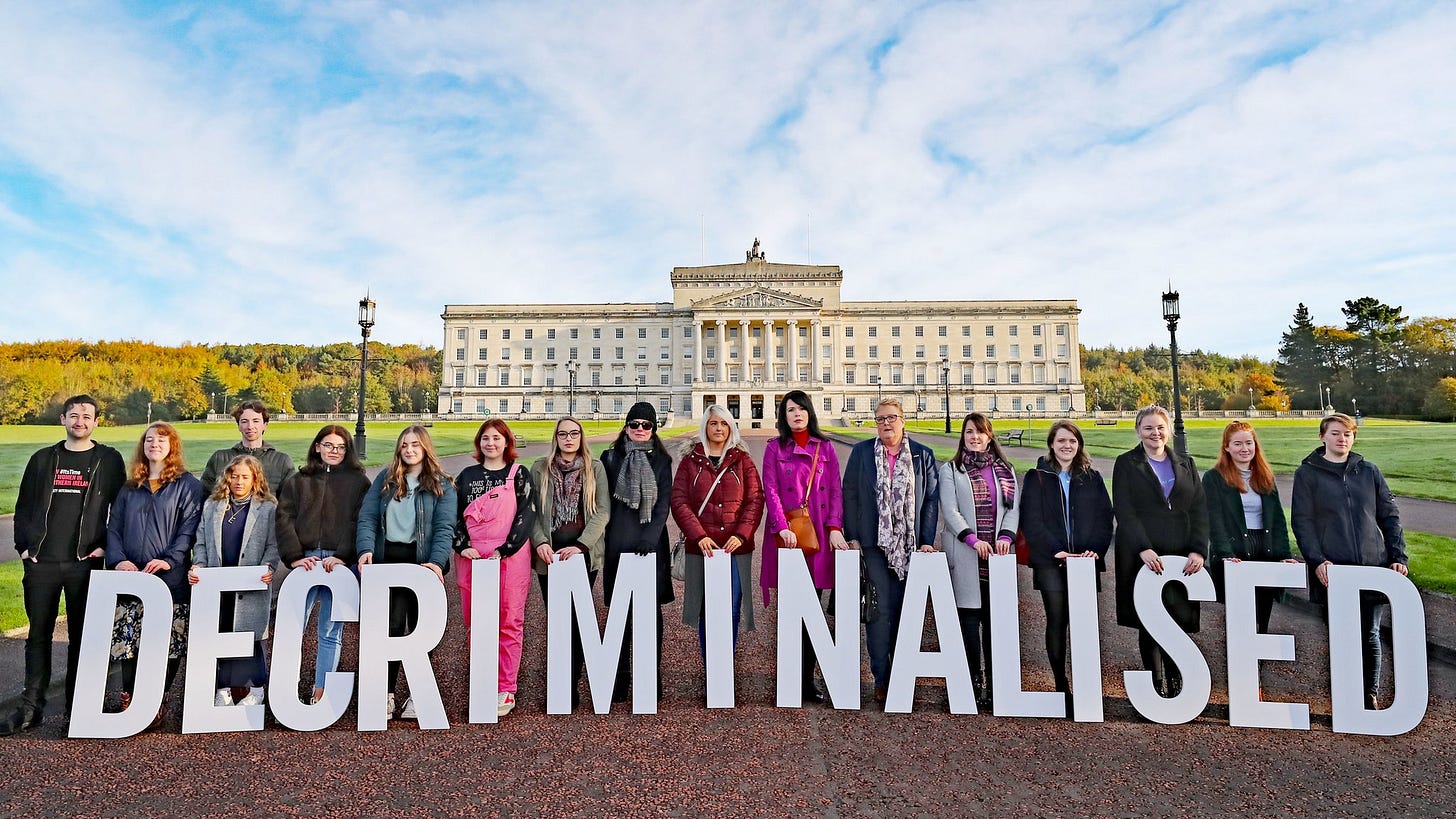Partial abortion decriminalisation for England and Wales
Summarising recent developments at Westminster - and the bigger picture
On Tuesday 17 June, a significant change to abortion law in England and Wales made its way through Parliament with the passing of MP Tonia Antoniazzi’s NC1 amendment by 379 to 137.
Despite misleading headlines in the British press that abortion is now “decriminalised”, unfortunately we must temper ourselves. The successful amendment does not go quite as far as full decriminalisation (like we have in Northern Ireland) - but for now, women1 in England and Wales can no longer be prosecuted for having an abortion at any stage of pregnancy.
This amendment does not cease prosecutions of persons associated with abortion procurement: for example, medical practitioners or those who procure abortion pills for another person outside of the Abortion 1967 Act guidelines.
But at the same time, England and Wales are not Poland where medical professionals are continually harassed and investigated by the state. The urgency to protect medical professionals in GB isn’t at a code red. As it is, currently the “good faith” clause in the 1967 Act offers protections for medics from prosecutions:
Subject to the provisions of this section, a person shall not be guilty of an offence under the law relating to abortion when a pregnancy is terminated by a registered medical practitioner if two registered medical practitioners are of the opinion, formed in good faith.2
Support of this amendment by organisations such as Doctors for Choice UK and the British Society of Abortion Care Providers demonstrate the generosity and fearlessness of medical professionals in this sector to centre people who can get pregnant before themselves.
The passing of this amendment was urgent. We know that in the last decade, over 100 women have been investigated by police in England and Wales for having an abortion outside of the legal grounds outlined in the 1967 Abortion Act.
In May 2025, Nicola Packer endured four-and-a-half years of torment between her arrest and court date where she was accused of: “unlawfully administering to herself a poison or other noxious thing” with the “intent to procure a miscarriage”, after taking abortion pills prescribed to her by a registered provider during the November 2020 Covid lockdown.
Other cases, such as that of mother of three Carla Foster, have resulted in a conviction of 35 days of incarceration and a further 28 months on licence. Foster, a single mum to three children, was already ineligible for child support for her third child; due to the punitive Two-Child Benefit Cap, brought in by the Conservative Government in 2013, and so far, egregiously maintained by the Labour Party.
Territorial pissings
A rival amendment, tabled by Stella Creasy MP was also tabled for Tuesday 17 June. NC20 sought to go further than NC1 and remove Sections 58 and 59 from the Offences Against the Person Act 1861.
In 2019, these same sections were removed from the Offences Against the Person Act in Northern Ireland. This meant that Northern Ireland gained full decriminalisation of abortion and leapt from being one of the most punitive regions in the world as regards abortion care, to occupying the gold standard.
Speaking personally here and not on behalf of any group, I was very disappointed at the pitting of two abortion-related amendments against each other by Labour MPs. While NC20 was by far the more progressive option, its late tabling saw much in-fighting within the establishment women’s sector as well as between Labour politicians. There were many times in the past few weeks I felt that abortion-seekers were not centred in discussions and a good deal of territorial pissing was going on at a Westminster level.
In my opinion, Creasy should have held off and not competed with NC1, and then brought a comprehensive decriminalisation bill to Westminster in the autumn. Decriminalisation in an England and Wales context is more complicated than in the Northern Ireland situation too - we had a blank canvas to work from upon decriminalisation. England and Wales have been operating under the 1967 Abortion Act and decriminalisation will change some of those health infrastructures.
I had a pretty awful experience in Westminster myself in late May - I might blog about this another day - but having MPs treating me like their own personal assistant over the last few weeks as they fought to out-do one another has been very demotivating. Especially when the British government are up to their necks in complicity and funding for the ongoing genocide in Gaza. There’s utterly no reflection by MPs on this score by the way. How decriminsalition of abortion is part of reproductive justice - which means safe and secure communities for folks to choose or choose not to have children. And how this should mean safe and secure communities everywhere, including Palestine. These MPs are just carrying on with their delight at being in government like it ain’t no thing. It’s grotesque.
The Crime and Policing Bill
So, despite the in-fighting and other associated issues, at least we can say that there was a small win for people who can get pregnant in England and Wales. Right?
However, I’d invite us all to zoom out now from this small amendment and look at what bill the amendment was tacked on to - the Crime and Policing bill. I want to quote
here in her excellent article on this bill (linked below):Labour have been tactically leveraging liberal identity politics - channelling this exclusively through the lens of criminalisation and law and order - to build consent by giving different groups crumbs to sing and dance about. They allow some NGOs or interest groups to garner small wins, or perceptions of small wins, through amendments. These amendments then generate support for the Bill in its entirety: after all, the whole Bill needs to pass in order for the amendment to become law. Simultaneously, this props up one of the state’s core ideological containment strategies: creating the belief criminalisation and policing can effectively respond to social and political oppression.
The passing of the Crime and Policing bill means, among others, that you can be arrested for: concealing your identity at a protest or climbing on monuments or memorials. It means that the police will have the power to deport people with limited leave to remain; and it also allows for the deployment of facial recognition powers - i.e. allowing driver license pictures for facial recognition searches (important to note that facial recognition technology is already being flagged for disproportionate instances of racial bias and profiling).3
In order to get this vile bill over the line, as McBean astutely observes, Labour have been giving piecemeal “wins” such as abortion decriminalisation for people who can get pregnant in order to gain a malevolent hold over the general public, our right to protest, our right to privacy, and freedom of expression.
Arguably, the competing amendments and the disagreements between NGOs have all been a smoke screen that even the most hardened feminists have been sucked into. The urgent panic to get some form of decriminalisation into practice spurred on by “show trials” where desperate and vulnerable women were publicly criminalised and shamed by an 1861 law. It all sounds very reasonable to me that the British government would employ these strategies so that opposition to the Crime and Policing bill would be muzzled and instead, actually supported.
I don’t blame Creasy or Antoniazzi specifically here - rather it’s clear that like the Conservatives, the Labour machine - led by a spineless “human rights barrister” who can’t identify genocide when it’s being live streamed in front of him - are pulling the wool over our eyes and leading us into a controlled state.
Why, of all bills, was abortion decriminalisation tacked onto this one?
What good will abortion decriminalisation be if our movements can be monitored by the state through facial recognition technology? What good will decriminalisation be if we cannot protest the two-child benefit cap? Not to sound like I’m a conspiracy theorist, but what good will piecemeal wins be if Big Brother is tracking our period apps, watching us travel to and from different places, mapping our visits to health centres, activist meetings.
All it takes is one anti-abortion health secretary to reverse decriminalisation and the rest will fall into place. We can never be complacent.
When I use the term “women”, I refer to any person who can get pregnant.






